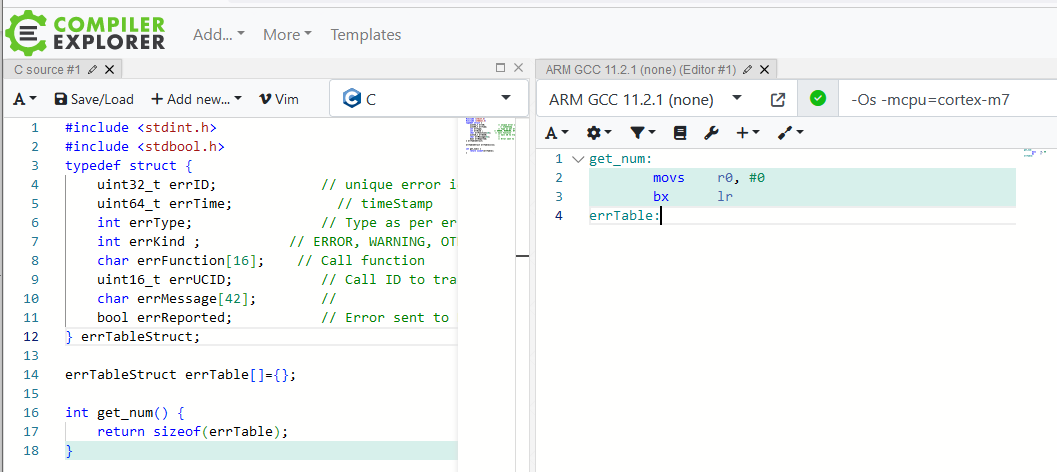Hi i need help to find out how i am corupting my ISR.
I have just written a simple routine to trap errors so that i can report them and help with debugging, espcially my interupt timings.
When i i run it i noticed that my timer interupts became corupted for no reason. that i can find anyway. here is the code.
>
> /*
> MyErrREPORT.cpp
> Ver: 1.0.0.1
> Date: 2 APR 2024
> */
>
> #include "MyErrReport.h"
> #include "MyRtc.h"
>
> uint32_t errEIDcounter;
> uint32_t errCADcounter;
> uint32_t errPARcounter;
> uint32_t errPAKcounter;
> uint32_t errSAPcounter;
> uint32_t errSAWcounter;
>
> const char* errKindLU[] ={ "ERROR",
> "WARNING",
> "OTHER"};
>
> const char* errTypeLU[] ={ "CADENCE",
> "PARCEL",
> "PACKET",
> "SAMPLE",
> "SAMWIN"};
>
> errTableStruct errTable[]={};
>
> void ReportError(int errType, int errKind, const char* errFunction,
> uint16_t errUCID, const char* errComment, bool errPrint){
>
> int n = sizeof(errTable)/sizeof(errTable[0]);
> n++;
> char intChar[5];
>
> // Add to Error Array
> errTable[n].errID = errEIDcounter++;
> errTable[n].errTime = getRealTimeClock();
> errTable[n].errType = errType;
> errTable[n].errKind = errKind;
> strcpy(errTable[n].errMessage, errComment);
> strcpy(errTable[n].errFunction, errFunction);
> errTable[n].errUCID = errUCID;
> errTable[n].errReported = FALSE;
>
> // Inc error counters
> if(errType == ERT_CADENCE){errCADcounter++;}
> if(errType == ERT_PARCEL){errPARcounter++ ;}
> if(errType == ERT_PACKET){errPAKcounter++ ;}
> if(errType == ERT_SAMPLE){errSAPcounter++ ;}
> if(errType == ERT_SAMWIN){errSAWcounter++ ;}
>
> //If True Print to Serial
> if (errPrint == TRUE){
> Serial.print("\tEXCEPTION: " );
> Serial.print(errKindLU[errKind]); Serial.print(", ");
> Serial.print(errTypeLU[errType]); Serial.print(", ");
> Serial.print(errFunction); Serial.print(", ");
> Serial.print(errUCID); Serial.print(", ");
> Serial.println(errComment);
>
> }
> }
and here is the header.
/* BUCKOS HEADER FILE MyLCD.h
Header file for MyLCD.cpp
Version: 001
Date: 6 March 2024
Board: Arduino Portenta H7 (PH7)
Extra: PH7 Breakoutboard
uP: ST STM-32
*/
// This header is for my USB setting
//#pragma once
#ifndef MyErrReport
#define MyErrReport
#include <Arduino.h>
#include <Arduino_PortentaBreakout.h>
#include "ProjConfig.h"
#include "MyRTC.h"
// Structure Error Table
typedef struct {
uint32_t errID; // unique error id
uint64_t errTime; // timeStamp
int errType; // Type as per errTy
int errKind ; // ERROR, WARNING, OTHER
char errFunction[16]; // Call function
uint16_t errUCID; // Call ID to trace exact error
char errMessage[42]; //
bool errReported; // Error sent to Puter
} errTableStruct;
//errTableStruct errTable[];
#define ERY_ERROR 0
#define ERY_WARNING 1
#define ERY_OTHER 2
extern const char* errKindLU[];
// Structure Error type
#define ERT_CADENCE 0
#define ERT_PARCEL 1
#define ERT_PACKET 2
#define ERT_SAMPLE 3
#define ERT_SAMWIN 4
extern const char* errTypeLU[];
extern uint32_t errEIDcounter;
extern uint32_t errCADcounter;
extern uint32_t errPARcounter;
extern uint32_t errPAKcounter;
extern uint32_t errSAPcounter;
extern uint32_t errSAWcounter;
//extern uint32_t errEIDcounter;
void ReportError(int errType, int errKind, const char* errFunction,
uint16_t errUCID, const char* errComment, bool errPrint);
#endif
The Timer interupts are handled by libarays built by Khoi Hoang https://github.com/khoih-prog/Portenta_H7_TimerInterrupt
When i start to write data to my errTable it actually writes to the ISR_Timer obj that was created via the “Portenta_H7_TimerInterupt” librays.
For example when i debug and stop at the “errTable[n].errID = errEIDcounter++;” line and hold my mouse over it. It will say ISRT and an address x24001888, instead of “errTableStruct errTable[0]” as i would expect.
Am i creating and declaring my arrays correctly?
